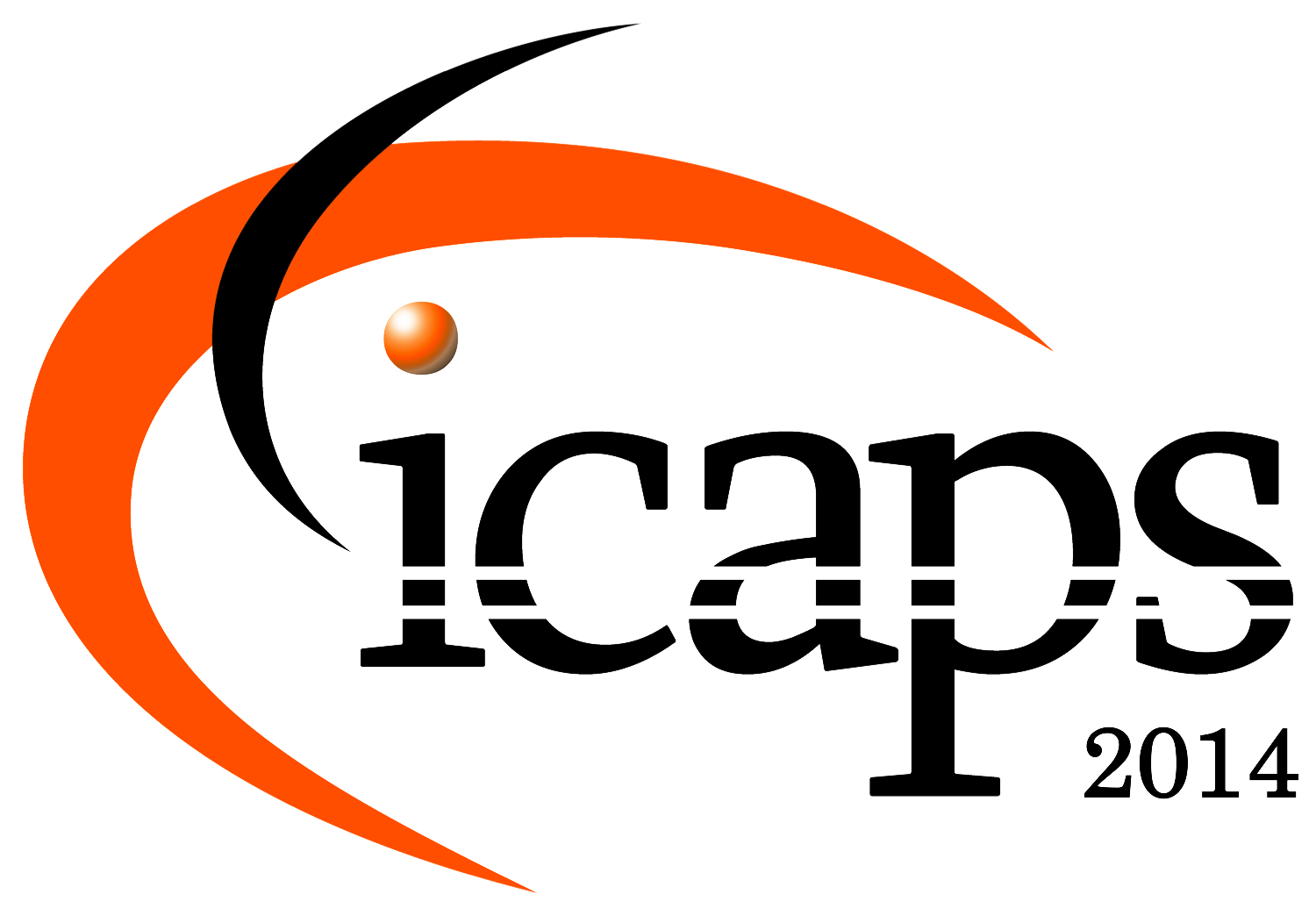WS 3: Distributed and Multi-Agent Planning (DMAP)

Multi-agent planning is a broad field with many applications, but its subfields remain mostly dispersed and uncoordinated. The main goal of the 2nd Workshop on Distributed and Multi-Agent Planning (DMAP), as in the previous edition, is to bring researchers working in these subfields together and to bridge the gap between the planning and multi-agent systems communities.
(This CFP in plain-text and PDF)
The full DMAP proceedings are now available.
Topics
The organizing committee of DMAP’14 invites paper submissions on topics related to distributed and multi-agent planning. Relevant topics to the workshop are, among others:
- Multiagent planning and scheduling applications
- Techniques to overcome multiagent planning complexity
- Plan coordination/merging
- Distributed planning and scheduling
- Multiagent planning system architectures
- Multi-robot systems
- Self-interested planning agents
- Game theoretic planning
- Distributed planning under uncertainty
- Privacy in distributed planning
- Evaluation and benchmarks for distributed planning
- Centralized, decentralized and factored multiagent planning
- Multiagent planning problem modeling techniques and languages
- Domain-dependent and domain-independent multiagent planning
Workshop Format
DMAP’14 is a full-day workshop, organized in technical sessions. Each presentation will be followed by ample time for questions, discussions.
Schedule
| 08:20-08:30 | Welcome |
| Oral Presentations | |
| 08:30-09:00 |
Ronen Brafman and Uri Zoran Distributed Heuristic Forward Search with Interacting Actions |
| 09:00-09:30 |
Jan Tozicka, Jan Jakubuv, Karel Durkota and Antonin Komenda Multiagent Planning by Iterative Negotiation over Distributed Planning Graphs |
| 09:30-10:00 |
Matthew Crosby and Ron Petrick Temporal Multiagent Planning with Concurrent Action Constraints |
| 10:00-10:30 | Coffee Break |
| 10:30-11:00 |
Andrea Bonisoli, Alfonso Gerevini, Alessandro Saetti and Ivan Serina A Privacy-preserving Model for the Multi-agent Propositional Planning Problem |
| 11:00-11:30 |
Yu Zhang and Subbarao Kambhampati A Formal Analysis of Required Cooperation in Multi-agent Planning |
| 11:30-12:00 |
Shamin Kinathil, Scott Sanner and Nicolas Della Penna Closed-form Solutions to a Subclass of Continuous Stochastic Games via Symbolic Dynamic Programming |
| 12:00-13:45 | Lunch Break |
| 13:45-14:15 |
Aris Valtazanos and Mark Steedman Improving Uncoordinated Collaboration in Partially Observable Domains with Imperfect Simultaneous Action Communication |
| 14:15-14:45 |
Nerea Luis and Daniel Borrajo Plan Merging by Reuse for Multi-Agent Planning |
| 14:45-15:15 |
Filippos Kominis and Hector Geffner Beliefs in Multiagent Planning: From One Agent to Many |
| 15:15-15:45 | Coffee Break |
| 15:45-16:15 |
Jesús Virseda Jerez, Susana Fernández and Daniel Borrajo Multi-Agent Planning with Agent Preferences |
| 16:15-16:45 |
Alejandro Torreño, Eva Onaindía and Óscar Sapena Integrating individual preferences in multi-agent planning |
| 16:45-17:15 | Open Discussion |
Accepted Papers
- Distributed Heuristic Forward Search with Interacting Actions.
Ronen Brafman and Uri Zoran. - Plan Merging by Reuse for Multi-Agent Planning.
Nerea Luis and Daniel Borrajo. - Improving Uncoordinated Collaboration in Partially Observable Domains with Imperfect Simultaneous Action Communication.
Aris Valtazanos and Mark Steedman. - Beliefs in Multiagent Planning: From One Agent to Many.
Filippos Kominis and Hector Geffner. - Multi-Agent Planning with Agent Preferences.
Jesús Virseda Jerez, Susana Fernández and Daniel Borrajo. - Multiagent Planning by Iterative Negotiation over Distributed Planning Graphs.
Jan Tozicka, Jan Jakubuv, Karel Durkota and Antonin Komenda. - A Privacy-preserving Model for the Multi-agent Propositional Planning Problem.
Andrea Bonisoli, Alfonso Gerevini, Alessandro Saetti and Ivan Serina. - Temporal Multiagent Planning with Concurrent Action Constraints.
Matthew Crosby and Ron Petrick. - A Formal Analysis of Required Cooperation in Multi-agent Planning.
Yu Zhang and Subbarao Kambhampati. - Integrating individual preferences in multi-agent planning.
Alejandro Torreño, Eva Onaindia and Óscar Sapena. - Closed-form Solutions to a Subclass of Continuous Stochastic Games via Symbolic Dynamic Programming.
Shamin Kinathil, Scott Sanner and Nicolas Della Penna.
Submission
Paper submission is in PDF only, formatted in AAAI style . Refer to the author instructions on the AAAI web site for detailed formatting instructions and LaTeX style files. Final papers will be in the same format, keep them to at most 8+1 pages long (meaning 8 pages plus 1 extra page containing only references). We also welcome the submission of short position papers (at most 4+1 pages long). Papers must be submitted by March 7th, 2014. All deadlines refer to 23:59 in the UTC-12 time zone. Paper submissions should be made through the workshop EasyChair web site.
Any accepted papers are welcome to have a poster in the poster session held on Tuesday afternoon (on 2014.06.23) during the main conference.
Important Dates
- Paper submission:
March 7th, 2014 - Notification of acceptance:
March 20th, 2014 - Camera-ready paper submissions: TBD
- Workshop date: June 22nd, 2014
Organizing Committee
- Daniel Borrajo (Universidad Carlos III de Madrid, Spain)
- Dániel L. Kovacs (Budapest University of Technology and Economics, Hungary)
- Alejandro Torreño (Universitat Politècnica de València, Spain)
Program Committee
- Ronen Brafman (Ben-Gurion University of the Negev, Israel)
- Bradley J. Clement (NASA Jet Propulsion Laboratory, USA)
- Amanda Coles (King's College London, UK)
- Tadeusz P. Dobrowiecki (Budapest University of Technology and Econonmics, Hungary)
- Naoki Fukuta (Shizuoka University, Japan)
- Antonín Komenda (Technion, Israel Institute of Technology, Israel)
- Raz Nissim (Ben-Gurion University of the Negev, Israel)
- Eva Onaindia (Universidad Politècnica de València, Spain)
- Scott Sanner (National ICT Australia (NICTA), Australia)
- Matthijs Spaan (Delft University of Technology, Netherlands)
- Roni Stern (Harvard University, USA)
- Mathijs de Weerdt (Delft University of Technology, Netherlands)
- Shlomo Zilberstein (University of Massachusetts, Amherst, USA)

